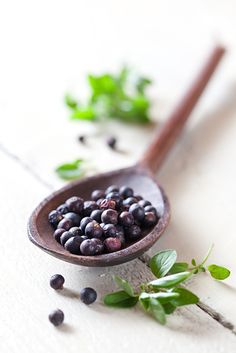Juniper Berry's Substitutes

Juniper berries are quite similar to one of our favorite fruit, blueberry. Before you get confused, they are not the same thing. Juniper berries got their name from their culinary use. It is used in most European and Scandinavian cuisines for meat dishes like game meat and even sauerkraut dishes.
If you don’t have juniper berries and want to make a typical European meal, you may replace rosemary, caraway seeds, gin, cardamom, bay leaves, and hickory spice.
Let’s try to master these European cuisines without using juniper berries.
Juniper Berries Substitute
1. Rosemary

Rosemary is a versatile herb. You may get it dried or whole from the grocery store for a sustainable herb source right in your kitchen. It is ideal for pan-seared meals like steaks. A few sprigs of it can enhance the scent and flavor of the meat. Aside from culinary applications, it is also used to produce fragrances, essential oils, and scented cleaning liquid detergents.
How to Make a Substitute
For this one, the replacement is fairly straightforward. You can replace at least 2-3 sprigs of rosemary with one teaspoon of juniper berries. Toss in a couple of rosemary sprigs, and you’re done.
With the lack of juniper berries, this can already make a difference. If you’ve recently harvested some fresh game meat or other red meats, this is an excellent replacement for achieving that particular scent and flavor.
You may either add the rosemary into the marinade ahead of time or sauté it straight in the pan with the meat. I recommend doing the latter since it enhances the flavor and fragrance of the meat even more.
2 . Caraway Seeds
If you can find caraway seeds in your neighborhood, that’s fantastic! This is typically available at herb and spice stores. If you can’t, you can purchase online because foreign shipping is accepted in most nations.
It is an ideal alternative for juniper berries because of its near licorice flavor and very fragrant properties. You can tell whether a meal has it because it brings out the finest food without dominating it.
How to Make a Substitute
When replacing, you can use a 1:1 ratio. One teaspoon of caraway seeds can be substituted for one teaspoon of juniper berries. Then, add a bay leaf or two, depending on how fragrant you want your meal to be.
3. Gin

Yes, gin may be used in place of juniper berries. I’m sure some of us have a collection of gins in our bar area or basement. Go to your basement instead of the grocery shop when you need juniper berries but don’t have any. The sort of gin has no fixed brand or alcohol concentration. This replacement may be made with whatever you have on hand.
How to Make a Substitute
Substitute one tablespoon of juniper berries with one teaspoon of gin. The gin imparts a more faint scent that is often not even detectable. You may also add extra herbs or spices to improve the scent if you want it to be more fragrant.
4. Cardamom
Cardamom is a unique spice commonly utilized in Indian cuisine and other delicious European desserts. When it comes to the kitchen, it’s surprisingly distinctive and adaptable. When you believe it has limited use, you may use this spice to replace juniper berries’ distinct flavor and scent.
Cardamom seeds are picked and dried before being used. It’s best used on savory foods to enhance the scent and flavor. Other forms of cooking make use of the complete pods and seeds.
It’s preferable to buy it while it’s ground for convenience. The only drawback to this spice is that it is more pricey than the other items we highlighted a while back. However, the change is worthwhile due to its capacity to mimic the distinct features of juniper berries.
How to Make a Substitute
The replacement is also pretty simple. Replace one teaspoon of juniper berries with one teaspoon of cardamom. Stick to the 1:1 ratio. The size of your dish will also determine it. Adjust the ingredients and taste test before adding more if you’re creating a large quantity.
5. Bay Leaves
Bay Leaf is a potent and fragrant spice that is well-known worldwide. It’s quite aromatic, and with only one leaf, it may immediately do some magic. These dried leaves are available in ground or whole form. That is entirely dependent on your preferences. Bay leaves are not edible; they are primarily utilized for their distinct perfume and flavor. After cooking, it is usually thrown.
How to Make a Substitute
If you don’t have the whole leaves, use one teaspoon of juniper berries instead of 1-2 bay leaves. If you have ground bay leaves, use a 1:1 ratio. Don’t worry about exceeding the ratio because bay leaves aren’t particularly potent when used in excess.
6. Hickory Spice

Hickory spices are now widely accessible in most grocery shops in various brands. Hickory spice combines herbs and spices such as cumin, garlic, onion, chile, salt, and, of course, hickory powder. It’s no surprise that this spice is fragrant and savory, making it an excellent alternative for juniper berries.
How to Make a Substitute
A teaspoon of juniper berries can be substituted for 1.5 teaspoons of hickory spice. If you enjoy the kick, you can do more. Because the spice isn’t spicy, I recommend using more than the 1:1 ratio. You can do a taste test to see whether the spice is appropriate for your palette. You can tweak the flavor and continue from there if you enjoy it.
What exactly are Juniper Berries?
Juniper berries are typically found in Europe, considered the most valuable spice. Its flavor acquires a distinct herb-ish and lemony flavor when it reaches maturity. It’s also best eaten while it’s fresh.
The Big Idea
Because of their distinct purposes, unique herbs and spices, such as juniper berries, can be challenging to replace or substitute. However, it may be easier to mix, match, and substitute with the correct understanding of different herbs and spices available.
The best advice I can provide is to constantly visit your local herb and spice shop and learn about its distinct qualities.
Experiment with different meals and note those that can be replaced with another.











